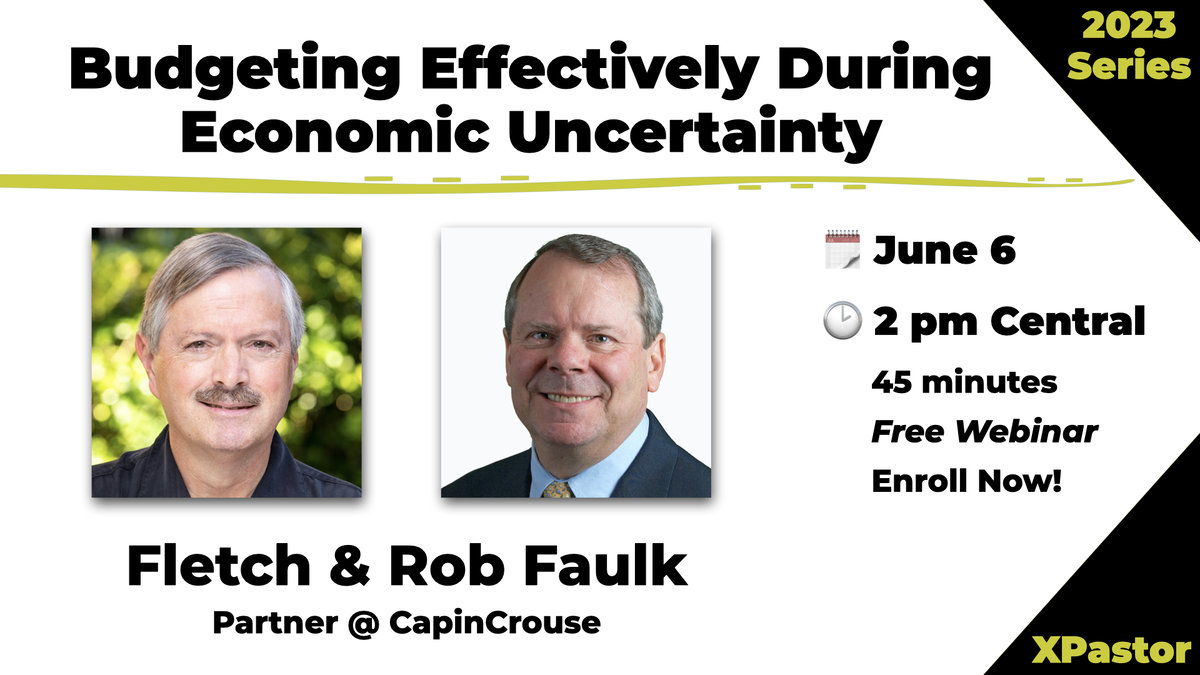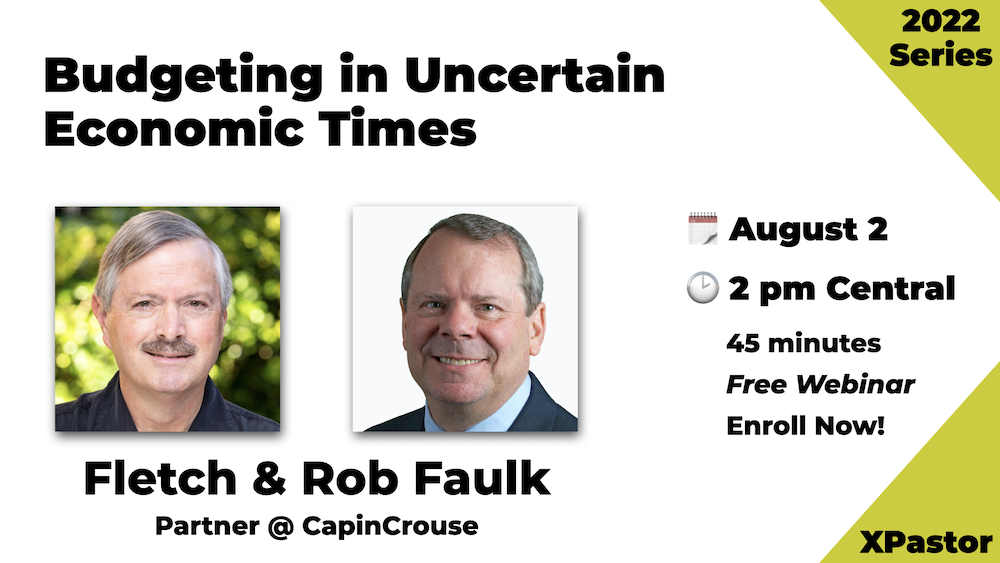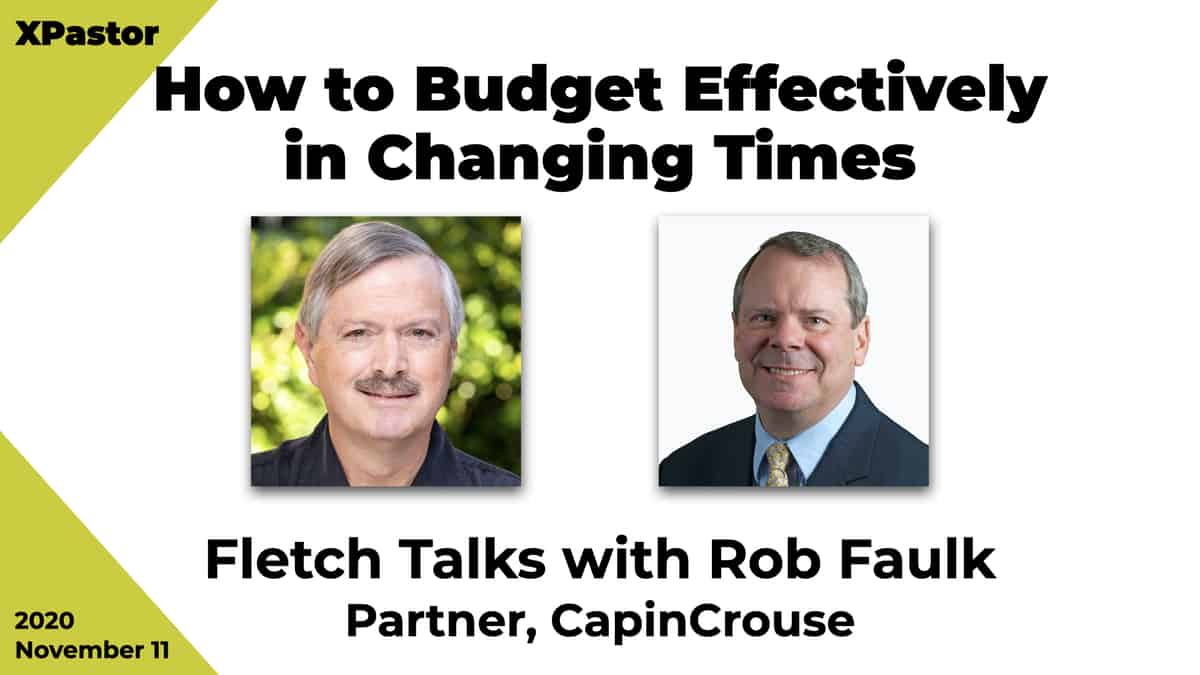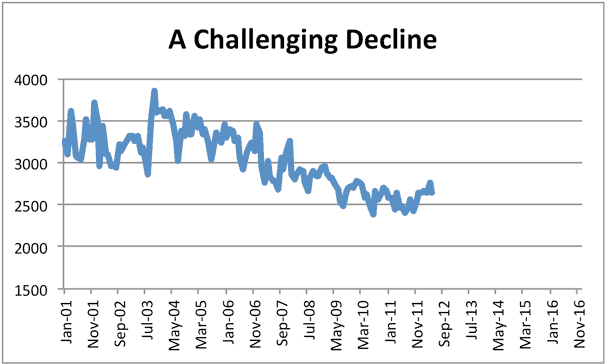It has been said that there are three kinds of leaders—the kind that makes things happen, the kind that watches things happen, and the kind that asks, “What just happened?” The shifting economy demands that we, as leaders, take an honest look at our mission, ministries, money, and motives. We must guard the trust given to us by God and our congregations—not just sit and watch and then ask, “What happened?” It can’t be business as usual because, with our current economy, it is not business as usual. Besides, the most important business is God’s business.
If we’re going to stay on mission while the economy is in a mess, we must lead our churches with careful consideration of the following:
Impose Brutal Evaluation
What are the mission critical ministries of our church? What financial resources do we need to enable them to succeed? If God wants us to do it, then we will have all the money we need to make it happen. If it’s God’s will, it’s God’s bill. We may not have everything we want, but we will never lack for what God leads us to do if we’re strategic stewards.
One of our strategies at Bridgeway Community Church has been to ask whether or not we need to replace a paid staff person when that person moves on from our employment. Each time, we consider whether a UPS (Unpaid Staff Person) or team of volunteers could work just as well. Consequently, some of our largest ministries—formerly led by paid staff—are now led by volunteer staff. Those ministries have grown and are vibrant and healthy under the volunteer leadership.
Make Strategic Decisions
It’s not enough to evaluate. There needs to be corresponding action in light of the evaluation. Like David’s boys, the Men of Issachar, “who understood the times and knew what Israel should do,” (1 Chron. 12:32) we need to determine what we need to do as church leaders, and then actually do it.
A few years ago, we felt the financial crunch at Bridgeway, as did other churches. When a church feels that pressure, one of two things must be done: Secure more resources or spend less. It was a day in our church’s history that our staff still talks about—with a lot more winsomeness now then when it occurred. When we told all staff to turn in their church credit cards so we could cut them up, there was an audible gasp from one ministry team—which caused laughter from the entire staff. This was a bold decision but necessary because of the decision that was announced next: There would be a budget freeze on all ministries. The credit cards were no longer needed since there was no money to spend—except any that would be taken in for a specific ministry event. We had used the word “freeze” before, but this time it was of arctic proportions. In fact, each ministry would have to find a way to do ministry with little or no money. Guess what? They did! They did it well and with a fantastic attitude. There were many creative variations; we saw collaboration between ministries that had previously settled into territorialism, particularly with regard to equipment and supplies. This decision ultimately made our staff much more of a community. That freeze lasted one whole year. We have since been able to invest financial resources in many ministries—the ones that were healthy or could be maximized if they had more money. But the community and unity of our staff has remained, even though the financial restriction has been removed.
In our state a few years ago, utility costs increased by 75 percent. That is a significant jump in anyone’s budget. With through-the-roof operation costs, we strategically changed our definition of “comfort,” keeping temperatures in the building a little warmer during the summer and a little cooler during the winter. A few degrees saved a lot of dollars in a big building—it reduced our costs by $3K per month. A strained economy can require strategic leadership decisions and more stringent stewardship than in any other time of a church’s history.
We’ve always taken great pains to make our print products at Bridgeway rival the best in marketing; that includes our Sunday morning programs (a.k.a. bulletins). But when we took a hard look at the fact that we could save $30K per year by eliminating them altogether, we pulled the trigger on that decision. It wasn’t the most popular decision we’ve ever made, that’s for sure. Many of our ministries had become dependent on the bulletin to get the word out, believing it was the best form of communicating and marketing their ministry events. We needed to help them unlearn that thinking and learn new ways of communicating. We added slides to our website and slides to our Sunday service screens during the offertory/announcements. An announcement page on our website was added that could be updated daily. We mentioned our website and ministry network, The City, in every service and had ministries collaborate by making inter-ministry announcements at their events. Part of this decision was to save green, but another part of it was to go green by using less paper. Again—strategic decisions. As a result, we have watched attendance and involvement at our church ministry events increase. It took some time, but we’ve learned new ways to communicate.
Pray God-Dependent Prayers
The economy has caused us to become even more dependent on God for the provision of resources. We’ve made a conscious decision to pray in the service before the offering—that God would lead people to give cheerfully, sacrificially and intentionally—and that God would bless those that give with unexpected resources. We’ve cleared a night of the week, every week, to come together to pray as a church. We are seeing the power of God—right before our very eyes—as a result of our commitment to have our hearts fully committed to God. We pray for jobs, salary increases, bank loans to go through, and foreclosures to not go through. We are praying for increased tithes and offerings, coupled with big doses of God-type wisdom in stewarding every penny of those resources. We pray for divine downloads of specific direction. For pure motivation. For good favor with our vendors. For a spirit of cooperation from our paid staff as well as unpaid staff. For more faith and the courage to exercise it. For the promised peace that we can’t fully understand. It’s time to pray more. And that praying has resulted in a weekly family reunion of shared dependence on God. We saw our little group of 35 people grow upwards to 300 people meeting for prayer every Tuesday night. It has become an unscripted and little-programmed powerful pillar in our church. This prayer meeting has helped remind us leaders that the church is not only an organization but also an organism. Tuesday Night Prayer has become one of our premier delivery systems where we witness the church being The Church as people pray for one another and give money, cars, food, jobs, and places to live to each another.
Do The Big “Ask”
We’ve always been sensitive to the fact that many guests in our services may have preconceived ideas that church leaders just want them at the church to get their money. For the past 21 years of our church’s existence, we have given an offering disclaimer each week during the Sunday services. We used to say, “At this time in the service, we are going to take an offering. If you are a guest with us today, this time is not for you. But for those of you who call Bridgeway home, this is a time to give back to God.” Now we say something quite different. We say, “Worship here at Bridgeway is free. But as part of that worship we are going to give you an opportunity to give something back to God. If you are our guest, please know that we did not design this part of the service to make you feel obligated to give. If you want to let the bag pass you by, that’s perfectly fine. If you feel led to give, that’s cool, too.”
With a strained economy, people have less discretionary income—although you wouldn’t know it by the length of the lines at the movies or Starbucks in my community. When people have less money to spend, they are more contemplative about what they do with it. They tend to waste less money. They tend to spend their money more on things that really matter to them. We need to help our people see what matters and challenge them to invest in those things. This will require challenging our leadership and our congregations to give by faith and not by sight or the bottom line. In the timeless words of Warren Wiersbe, “Faith is like a muscle—it gets bigger every time we exercise it.” The more we show God our faith, the more He shows His faithfulness. As God shows His faithfulness, it actually increases our faith and spurs us on toward even greater demonstrations of faith-giving—which in turn, allows God to show off His faithfulness. It’s not a vicious cycle but a victorious cycle!
Bridgeway is located in Columbia, Maryland—a planned community owned by a company (Google Columbia and you’ll see how unique it is). This makes the ownership of property and facilities by churches challenging. We acquired the use of our current facility via a lease. It had been a manufacturing plant and corporate headquarters for a sports equipment company prior to us moving in and “future-fitting” it for ministry. We were fine with that arrangement but then something unexpected happened. The owners came to us with a brief window of opportunity that would allow us to purchase the facility. We needed $250K cash for earnest money—and we needed it during the summer, when attendance and offering trends were down, people were on vacation and the economy was in the tank—specifically the gas tank. So, on a Sunday in July, we painted a picture of our refocused vision, our tightened spending belts, what purchasing vs. leasing would mean for the current cash flow, as well as how we could secure the financial future (humanly speaking) of our church. We also set-up online giving on our website so internet viewers could participate. If we met this goal, then the only explanation would be that God did it. We asked the people to pray and then give above and beyond their usual amount the following week—just seven days later. The following Sunday we watched God not only provide, but show off as we received $326K. And our regular offering that day was significantly higher than several months prior! God’s economy is not our economy. We have not, because we ask not.
Implement a Plan of Practical Teaching and Personal Coaching on Finances
Traditionally, we have not talked much about money at our church, nor have we been accused of over-teaching on the subject. We changed that. We began teaching on this subject. We owe it to our people to teach what the Bible says about giving, stewardship, and money management, and teaching that our mission as Christ-followers is to seek God’s agenda first. How will they experience the full blessings and benefits of following Jesus if they don’t know how to give and live according to the financial principles found in the Bible? We offer fiscal literacy seminars and personal financial advising for free or at rock-bottom prices. We believe that obedience brings blessing and disobedience brings disaster. We love our people so much that we want them to succeed in every aspect of life—and believe that their spiritual journey is directly connected to their financial journey. We know there are mitigating circumstances, other than money, in one’s spiritual journey; however, evangelical Christ-followers have steered clear of the connection for far too long. Consequently, the people that God has entrusted to us have suffered—and therefore, His church has suffered.
Explore Other Revenue Opportunities
As we look at the economy and our mission as a church, we need to be creative in getting more people aware of our church so that we can impact them with the Good News of Christ. If the community doesn’t know about us, they won’t come to our services. If they don’t come to our services, they won’t experience worship and the Word. If they don’t experience worship and the Word, they won’t trust Christ and experience new, abundant, and eternal life. And if that doesn’t happen, to some degree, we are failing our mission.
But if people of the community have a positive experience at an event in our building that is not a religious event, then they become aware of our church through a whole different context. Barriers are broken down and bridges are indirectly built. That’s why our leadership team is looking at ways to rent out our building for various business meetings, conferences, and training events—to both non-profit and for-profit entities.
We have the largest performing arts theater in town with the best sound and lights. Why wouldn’t a corporation hold their annual employee meeting in our facility—and pay us? Why wouldn’t the jazz festival want to use our theater instead of the local high school—and pay us? Why wouldn’t the Chamber of Commerce or Rotary want to rent a room in our building—and pay us? It’s a win-win-win-win situation. The church wins as people who have never been to a church service are now in our building, being exposed to our facility and staff, which cultivates the soil for potential connection in the future. The people win when they find out about our church, then come to a service and have their life changed by Christ. The church wins from increased revenue from the rental of the facilities and from increased offerings when new people come to the church services (not the motive but a real by-product/benefit). The community wins by using beautiful facilities, with a friendly staff, at fair-market rental prices. Everybody wins!
Don’t Hit the Panic Button
We’ve got one of those Staples’ Easy buttons in our executive suite. When you push it, you hear, “That was easy!” In these days we don’t hear it as often as we once did because we don’t hit the Easy button as much. But we’re not hitting the Panic button either. Our church is God’s church and He will take care of it if we, as leaders, listen to Him, obey His Word, follow His leading … and lead. God has not given us a spirit of fear, but of love, power, and self-discipline. God is in control and we are cool with that. Are you?








